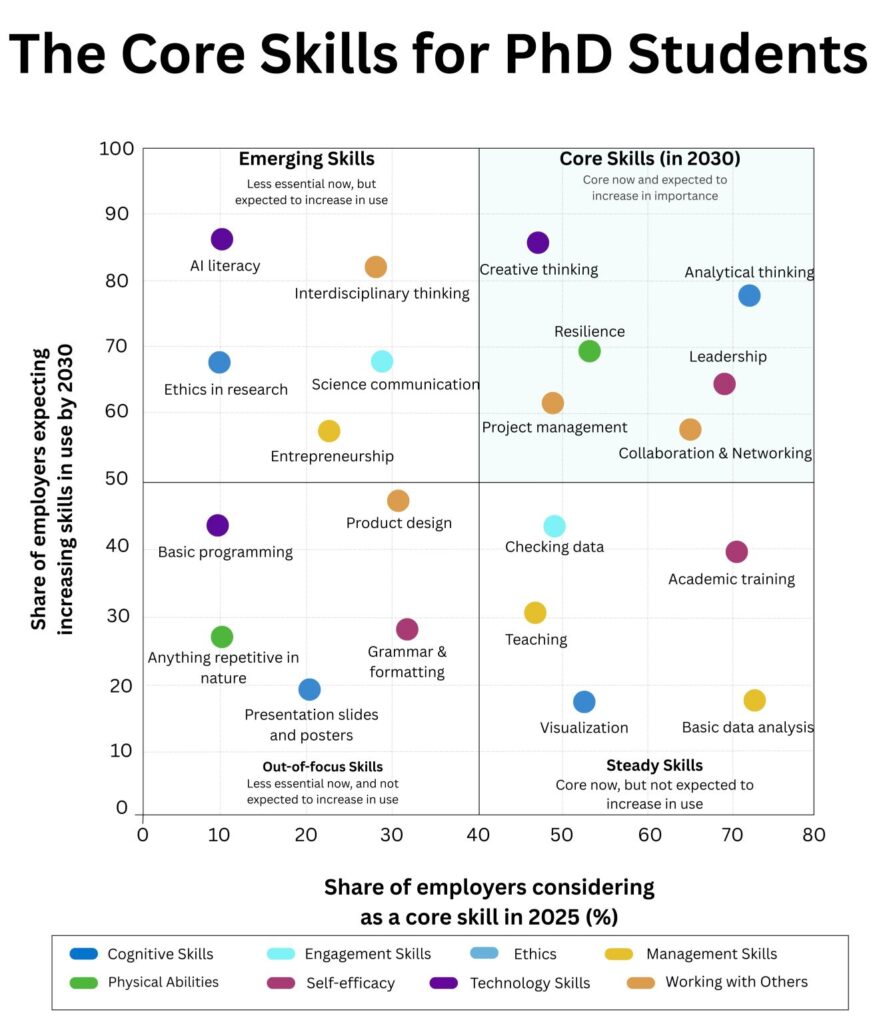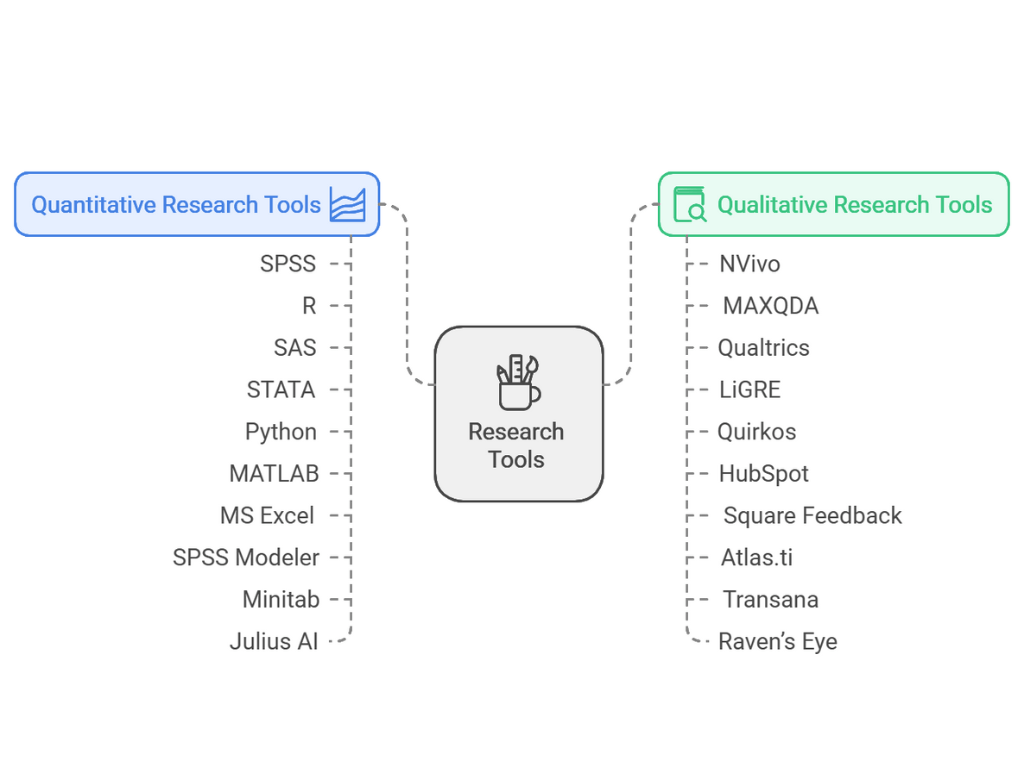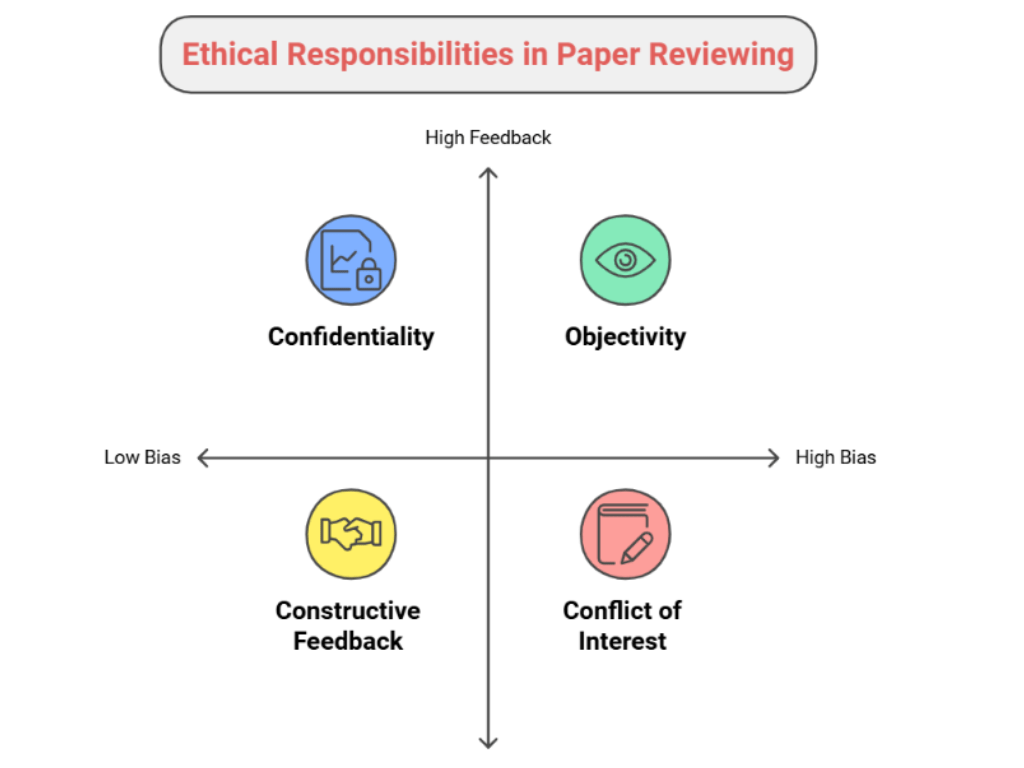
Do you need data for your research?
NexData provides free datasets for researchers across multiple domains.
Save time and accelerate your projects with ready-to-use data.
Doing a PhD is not just about writing a thesis. It is about building skills that will help you in research, teaching, and your future career. Some skills are already important. Some will grow in importance by 2030. Others are slowly becoming less relevant. And a few remain steady – they are basic skills you will always need.
Let’s break this down into Core Skills, Emerging Skills, Out of Focus Skills, and Steady Skills.

Core Skills (in 2030)
These are the skills that will matter most in the future. Every PhD student should focus on them.
1. Creative Thinking
Research is about solving problems that no one has solved before. Creative thinking helps you see new connections. It allows you to ask unique questions and design innovative experiments. Without creativity, research becomes routine.
2. Analytical Thinking
PhD research demands deep analysis. You need to look at data, theories, and arguments critically. Analytical thinking helps you separate facts from assumptions. It also allows you to spot flaws in methods and identify gaps in existing work.
3. Resilience
Rejections are part of PhD life. Papers will be rejected. Grants may not get approved. Experiments will fail. Resilience is your ability to stand up again and keep going. Without resilience, many students quit before finishing.
4. Leadership
PhD students often think leadership is for professors. But even as a student, you lead in many ways. You guide undergraduates, manage collaborations, or even lead projects. Leadership means taking responsibility and inspiring others.
5. Project Management
A PhD is a project that lasts three to five years. Managing time, resources, and deadlines is crucial. Project management ensures that you move step by step, stay organized, and finish on time.
6. Collaboration and Networking
No research happens in isolation. Collaboration makes your work stronger. Networking helps you learn from others, find opportunities, and get feedback. Building strong research networks can shape your entire career.
Emerging Skills
These are not always taught formally but are becoming very important. By 2030, every researcher will need them.
1. AI Literacy
AI tools are everywhere. From literature reviews to data analysis, they are changing research. Knowing how to use them effectively is no longer optional. AI literacy means not just using tools, but also understanding their limits and risks.
2. Interdisciplinary Thinking
Many big problems, like climate change or healthcare, cannot be solved by one field alone. Interdisciplinary thinking allows you to connect ideas from different areas. A computer scientist who understands biology, or an economist who understands psychology, will be much more valuable.
3. Ethics in Research
AI, data privacy, and human subjects – all raise big ethical questions. PhD students need to think beyond methods and results. They must ask: Is this research responsible? Is it fair? Ethics is becoming central to how research is judged.
4. Science Communication
Doing great research is one thing. Explaining it clearly is another. Science communication means sharing your work with both experts and non-experts. It includes writing, speaking, and even using social media. In the future, researchers who cannot communicate will be left behind.
5. Entrepreneurship
Not every PhD student will start a company. But entrepreneurship is more than business. It is about spotting opportunities, creating solutions, and thinking of impact. Researchers who think like entrepreneurs can turn ideas into real-world applications.
Out of Focus Skills
These are skills that mattered in the past, but will slowly lose importance.
1. Basic Programming
Ten years ago, every PhD student was told to learn coding. Today, AI tools are making coding easier. You should still understand concepts, but you don’t need to spend years learning complex programming if your field doesn’t demand it.
2. Product Design
Unless your PhD is in design or engineering, product design is not essential. It can be useful, but it is not a core skill for most researchers.
3. Grammar and Formatting
Journals used to reject papers for small formatting errors. Today, AI tools can fix grammar and formatting in seconds. You still need clear writing, but the burden of perfect formatting is gone.
4. Presentation Slides and Posters
These are useful, but again, tools can now create posters and slides for you. What matters is the content and clarity, not your design skills.
5. Anything Repetitive in Nature
Tasks like reference formatting, data entry, or repetitive calculations are no longer worth your time. AI and automation handle them better. Your focus should be on thinking, not on repetitive tasks.
Steady Skills
These skills are basic. They won’t grow in importance, but they will never go away.
1. Checking Data
You cannot rely only on AI tools. Researchers must always double-check data. Accuracy is the foundation of good research.
2. Teaching
PhD students often teach undergraduates. Teaching builds communication skills and deepens your own understanding. It will remain a steady part of academia.
3. Academic Training
This includes basic research methods, citation practices, and writing skills. These may feel old-fashioned but remain necessary.
4. Visualization
Presenting your data clearly will always be important. Graphs, charts, and visual summaries help others understand your work quickly.
Final thoughts
PhD students often ask: Which skills should I focus on?
The answer is simple:
So, PhD students, remember:
- Build core skills because they define your success.
- Learn emerging skills because they will matter tomorrow.
- Spend less time on out of focus skills because tools can handle them.
- Keep steady skills alive because they are your foundation.
The future of research is exciting. But it will also be competitive. PhD students who develop the right skills will not just survive – they will thrive.
So ask yourself today: Which skills am I building? Which skills do I need to let go of? And which new skills should I start learning?
The earlier you act, the stronger your PhD journey will be.
Don’t forget to read: Critical Questions for Researchers
Best of Luck..




